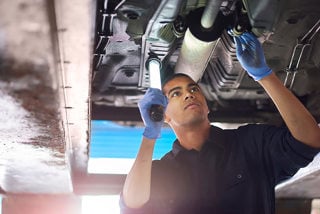Non-working headlights, indicators and reflectors accounted for just over a quarter (25.5%) of all MOT failures, data from the Driver and Vehicle Standards Agency (DVSA) suggests.
Faulty or broken suspensions represented just under a fifth (18.3%) of all failures in the 12 months to March 2022, while problems with brakes (17%) and tyres (12%) were the third and fourth biggest reasons for an MOT failure, according to analysis carried out by the RAC.
Bad visibility – likely cracks on windscreens – rounded up the top five, representing 8.7% of all MOT failures.
While a third of all initial MOT tests of cars, vans and small passenger vehicles – the equivalent to 7.3m vehicles – resulted in a fail, nearly one-in-10 tests – 8%, equivalent to 2.4m vehicles – worryingly result in a fail where at least one dangerous defect had been found.
In these most serious cases, where an examiner states a vehicle cannot be driven until that defect is repaired, brakes and tyres represent 88% of all such failures.
Although the biggest causes of MOT failures have remained consistent over many years, the proportion of tyre failures has increased slightly from 10% in 2018-19 to 12% in 2021-22.
The findings come as the Department for Transport (DfT) consults on overhauling the MOT, including changing the frequency of the vehicle safety test and improving the monitoring of emissions to tackle pollution.
Ministers claim the changes are necessary because today’s vehicles are built better and are more resilient to wear and tear, particularly with electric vehicles (EVs) having fewer moving parts.
RAC head of roads policy Nicholas Lyes said: “With more than 7.3m small passenger vehicles initially failing their MOTs, and alarmingly around 2.4m of these failures having at least one dangerous defect, the idea of relaxing rules on MOT tests could very well result in making our roads far more dangerous with the number of unroadworthy vehicles increasing.
“We hope the Government has finally consigned such an idea to the bin.”
Almost two-thirds of fleets say they would not support extending the first MOT from three years to four, according to a Fleet News poll.
Fleets fear that changing the current testing regime would be detrimental to road safety and suggest that vehicle mileages should be taken into account, rather than just the age of a car or van.





















Login to comment
Comments
No comments have been made yet.